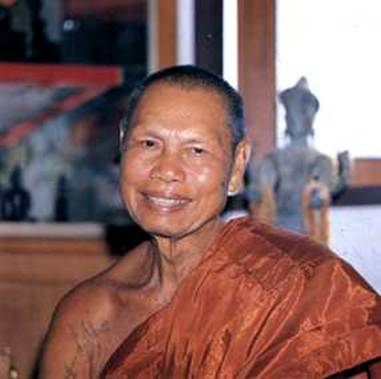The fifth of the ten perfections in Buddhism is Viriya-Parami, which means perseverance, effort, and energy. It is the effort to avoid and purify unwholesome mental actions when they arise. It is also the effort to cultivate and promote wholesomeness. Without effort, there will be no success, no good results.
Normally, our effort is in the direction of getting things or achieving something, such as fame, success, prestige and wealth. This is the normal aspiration of human beings where we put our most energy.
But when it comes to the Dhamma, the effort practised here is the opposite of wanting to achieve or to get something. Rather it is the effort to let go. First and foremost, it is to purify and reduce the impurities that arise in our minds. We try to let go of obstacles and unwholesome things, to learn to be peaceful. We use Viriya to work against inner habitual tendencies.
Viriya in the Buddhist Teachings
This right effort or energy occurs frequently in Buddhism. In the 37 limbs of enlightenment (bodhipakkhiya dhamma), Viriya is mentioned at least nine times. In the four prerequisites of enlightenment (sammappadana), the four foundations of spiritual power (iddhipada), the five spiritual faculties (indriya) and in the five spiritual powers (bala). Furthermore, in the seven factors of enlightenment (bojjhanga) and in the Noble Eightfold Path as right effort (samma vayama).
In the four prerequisites of enlightenment, viriya is described as the effort to prevent unwholesome mental states that have not yet arisen, the effort to abandon unwholesome mental states that have already arisen, the effort to cultivate mental states that have not arisen, and the effort to maintain wholesome mental states that have already arisen.
It is like cultivating a garden. When you have a garden, you also need these four kinds of right effort. One should avoid growing weeds in the garden. For weeds already grown, we have to remove them. These would be the first two efforts.
The second part of sammappadana is about promoting wholesome things. In this case, one plants vegetables, fruits, flowers, herbs and promotes these plants. So, once you sow the seeds, you try to do everything you can to make them grow well. Water them and fertilize them. Then as a result you get aromatic fruits, delicious vegetables and beautiful flowers.
The five hindrances
There are five hindrances in the mind which are obstacles, or the weeds that appear in meditation. They are: Anger, desire, doubt, restlessness, and drowsiness,
When we meditate, we try to avoid the appearance of these obstacles. This is the first effort. The second effort is to overcome obstacles that have already arisen. The third effort would be to bring wholesomeness into meditation. One strives to make the seven enlightenment factors (bojjhanga) arise in the mind. When they have arisen we nourish them.
The seven enlightenment factors are mindfulness (sati), investigation of dhammas (dhamma vicaya), energy or effort (viriya), rapture or joy (piti), tranquillity (passaddhi), concentration (samadhi), and equanimity (upekkha).
Dhamma vicaya means bringing the three characteristics of impermanence (anicca), non-self (anatta), and suffering (dukkha) to mind and reflecting on them again and again.
These are states of mind that lead us to the path of enlightenment – to awakening. They correspond to the positive part. Therefore, one tries to practice in such a way that they arise in the mind. And when they have arisen, one tries to further cultivate them, because they support us in our practice.
Iddhipada – The Four Bases of Mental Power
Viriya is also included in the Four Bases of Mental Power. In Pali the four mental powers are: chanda, citta, viriya and vimamsa.
Chanda is the will to act, or the zeal to do something. Citta is the mind that is enthusiastic. You can recognise the mind that is committed to the task in that you think about it all day long. For example, the moment you get up, you think about wanting to practice.
Viriya is the effort to do the practice. Vimamsa, or investigation, is always reflecting on the practice and checking if you are on the right path, or if you could improve something.
The Right Effort in the Noble Eightfold Path
Effort in the Noble Eightfold Path is to avoid unwholesome things and to let go of them if they have already arisen. Effort is also used to cultivate wholesomeness that has not yet arisen and to promote wholesomeness that has already arisen.
Viriya is important in daily life. For example, not following anger when it arises. Anger will arise, it cannot be avoided, it is an old habit that causes it to flare up in our mind. The problem here is not that it arises, but that we grasp it and then react, speak or act out of anger. By making the effort to stop reacting, I am no longer feeding the anger. The next time it arises, in a similar situation, it is weakened because I have stopped feeding it.
Even if craving arises, you don’t have to run after that craving immediately. Viriya helps us to do that.
In meditation, when we notice we are involved in thoughts and not focused, we bring up the energy to let go of the thoughts or doubts and come back to the present moment to continue with the practice. This is viriya.
How is Viriya created? How can I promote viriya?
The Buddha recommended that we reflect on the benefits of practicing now. When we practice, we experience more clarity, mindfulness, and calmness. These are the essential mental states for wisdom to arise. These reflections can also promote viriya and help us increase our aspiration for practice.
The Buddha also taught us other techniques to help us boost our energy in the practice. We could contemplate on the qualities of the Buddha (Buddhanusati), or contemplate on the qualities of the teachings, or Dhamma (Dhammanusati). These two reflections inspire us and give us energy.
We can also reflect on the results of unwholesomeness such as the sorrowful states of being. Reflecting on the hard lives of animals, the ghost and hell realms and the possibility of being reborn in these realms can help to increase our effort to practice the dhamma.
Contemplation on the Four Fundamental Thoughts of Vajrayana
One can also reflect on the four basic thoughts that are very important in Vajrayana Buddhism and should be reflected upon before any meditation.
The first is to reflect on the preciousness of human rebirth. As a human, we have the opportunity to connect to the Dhamma and to practice towards awakening. The second reflection is on impermanence. Death is certain but yet we are unaware of it.
The third basic thought is to reflect on the reality of cause and effect. It can be inspiring when we realise that we have been creating causes for a long time and these causes have effects. There is no telling what kinds of effects will come our way. Therefore, it is highly advisable to make this effort now.
The fourth reflection is to contemplate the disadvantages of samsara. Everything is constantly changing and impermanent. There are several planes of existence in which we could be reborn and some are suffering realms. Samsara has neither beginning nor end. Sometimes one is born in a higher realm, sometimes in a lower realm. All these require us to endure a lot of change and stress. Only when one is awakened can one escape the rounds of samsara. This can help inspire us to practice.
Conclusion
In summary, Viriya is the energy that helps us to overcome habitual patterns in our mind, to be able to deal with unwholesome states and let them go and to bring and promote wholesomeness in the mind.



